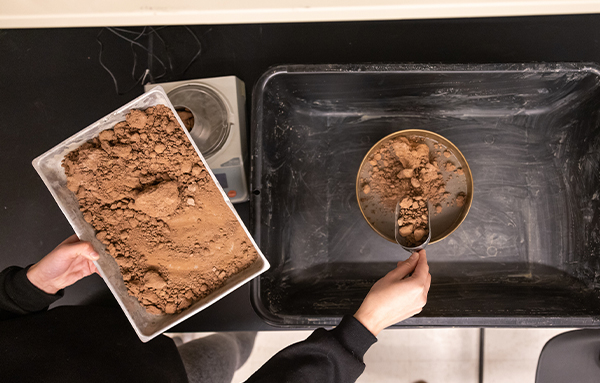
Environmental Studies - BA
If you have an interest in shaping environmental policy, addressing sustainability issues, and taking on environmental challenges, consider our interdisciplinary program in environmental studies.
If you have an interest in biology or chemistry and care about finding solutions to environmental problems and addressing sustainability issues, consider our environmental science major. At UHart, we offer you research and internship opportunities to jump start your career or prepare you for graduate studies.
Bachelor of Science
61-76
If you have an interest in biology or chemistry and care about finding solutions to environmental problems and addressing sustainability issues, consider our environmental science major. At UHart, we offer you research and internship opportunities to jump start your career or prepare you for graduate studies.
In our BS in environmental science program, you choose from two concentrations, one focused on environmental biology and the other centered on environmental chemistry. Both options provide you with the benefit of working with our expert faculty across a wide range of subject matter.
Our coursework, research opportunities, and internship experiences will help you develop cross-cutting and interdisciplinary skills to prepare you to apply scientific research findings thoughtfully when addressing environmental problems.

You prepare for a rewarding career addressing sustainability and environmental issues for industry, government, and nonprofit organizations.
Examples of careers include:
The median pay for an environmental scientist or specialist with a bachelor’s degree is $71,130, with 8% growth expected through 2028 according to the U.S. Bureau of Labor Statistics.
You must complete a total of 61-76 credits. A total of 12 required core courses (43 credits) provides you with a foundation in various disciplines important to the scientific study of the environment—biology, chemistry, environmental science, ecology, geology, and biostatistics. Required internship/research and capstone experience offer real-world, hands-on opportunities that help you prepare for a postgraduate career.
For more information, and to see a complete list of requirements, visit the Course Catalog.
You complete an additional 18-33 credits in your area of interest. You'd select from two areas of concentration.
You take the following courses
Choose two additional electives such as:
You take the following courses:
Choose twos additional electives such as:
For more information, and to see a complete list of requirements, visit the Course Catalog.
We work with students to assist them in securing a meaningful internship experience.

Students graduating with a BS in Environmental Science will be able to:

If you have an interest in shaping environmental policy, addressing sustainability issues, and taking on environmental challenges, consider our interdisciplinary program in environmental studies.

If you are planning a career in research or plan to go on to graduate, medical, dental school then the Bachelor of Science in Biology program is recommended for you.

Our Chemistry program is certified to meet the standards set by the American Chemical Society, the largest scientific society in the world.